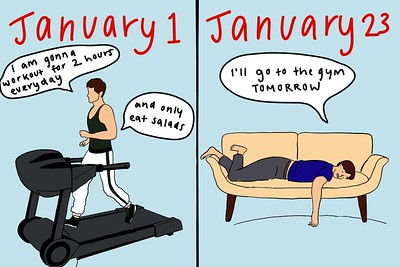“New Year, New Me” isn’t as effective as you may think

New year’s resolutions leave people unmotivated in less than a month.
February 7, 2023
“I will go to the gym after the New Year.” “I will get good grades next semester.”
Every year we hear the same expression, “New year, new me!” Though it is a new year, it is definitely not the new you. Whenever the new year rolls along, we practice the continued tradition of making New Year’s resolutions as a reminder of the things we can do to better ourselves, but unfortunately, the motivation for these goals do not last long.
The pressure we get to start everything from scratch makes it difficult to stick to our goals. As we try to mold ourselves into a new version, we want to see the outcome immediately whether it is with a weight loss journey or not procrastinating while doing work. But when results don’t show, our old habits start coming back.
According to Forbes, 64% of resolutions will be forgotten after one month. Their survey found improving mental health, fitness, diet and also losing weight to be the most popular goals among the Gen Z population.
Sabrina Romanoff, Psy. D, a Harvard-trained clinical psychologist, told Forbes, “We tend to set resolutions because the New Year serves as a cyclical marker of time during which we reevaluate and take inventory on our lives.”
As new year resolutions let us think and reflect on how we can do better and encourage us to make big goals, getting there requires behavioral changes and commitment. Change is hard, but it requires a sense of discomfort through consistency. And we often try to avoid feeling discomfort by setting a specific date for when we want to start, like when we say “I’ll start eating healthier next week.”
While one can think about all the changes that need to be made, starting the process should be the priority. Sometimes all it takes is designating five minutes to the task and just seeing where it leads to.
When we work to improve ourselves, it poses a challenge and disrupts the stability and routine we had. And with this, our brain works against us as it has to expend more energy to adapt to new situations. It craves comfort and safety, so when we suddenly change that, our brain wants to retreat and go back to its natural habit.
In an NBC article, Dr. Sanam Hafeez, a clinical psychologist and neuropsychologist, said, “From an evolutionary standpoint we develop these neural pathways to adapt to live, so when we encounter change our brain shifts into a protective mode … it doesn’t know, from that evolutionary standpoint, if the change is good for us or not.”
Our mind is our control center, but if we let it govern us, how will we get out of our comfort zone to try new things?
Exposing ourselves to different things each day can train our minds to adapt to changes around us and allow us to be more receptive to it as well.
One way that this can be done is by writing out a specific plan for each part of the day to hold yourself accountable and can keep you on track of what you need to be doing at a specific time.
We don’t have to make drastic changes all at once, but we can make small improvements in our daily lives that refine our behaviors, eventually leading us down a successful path of achieving the big goals we set for ourselves.
Though with progression, there are going to be some setbacks. Many of us are afraid of failing because it puts us back into the position where we have to start all over and rekindle that motivation to get us back on track.
But this can be a time where we figure out what works for us and what doesn’t. While every circumstance is different in the types of struggles we face, we will have to find an alternative one way or another, and sometimes even asking for help along the way can put things in a better perspective for you to overcome the obstacle.
Going through this setback can be a journey in itself, but taking the time to review your mistakes and learning from it can be the most important part. Through this, we can adjust what we do in our daily lives, and can improve upon other skill sets as well, such as problem-solving or discipline, skills that can be used in other aspects of our lives.
We see growth through our failures and become more resilient with it, and as time goes on we create a drive within ourselves to fulfill what we set out to do.
At the end of the day, everyone’s journey with their goals are different and their successes can be defined differently than yours, so it is good to remind yourself of the positives in your life while also making sure that the things you are doing are for the better.



